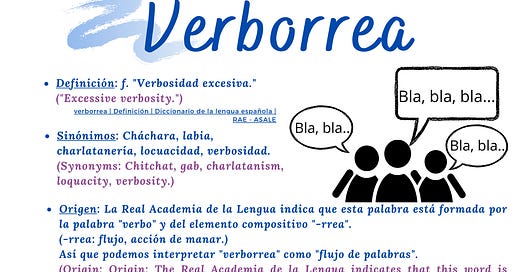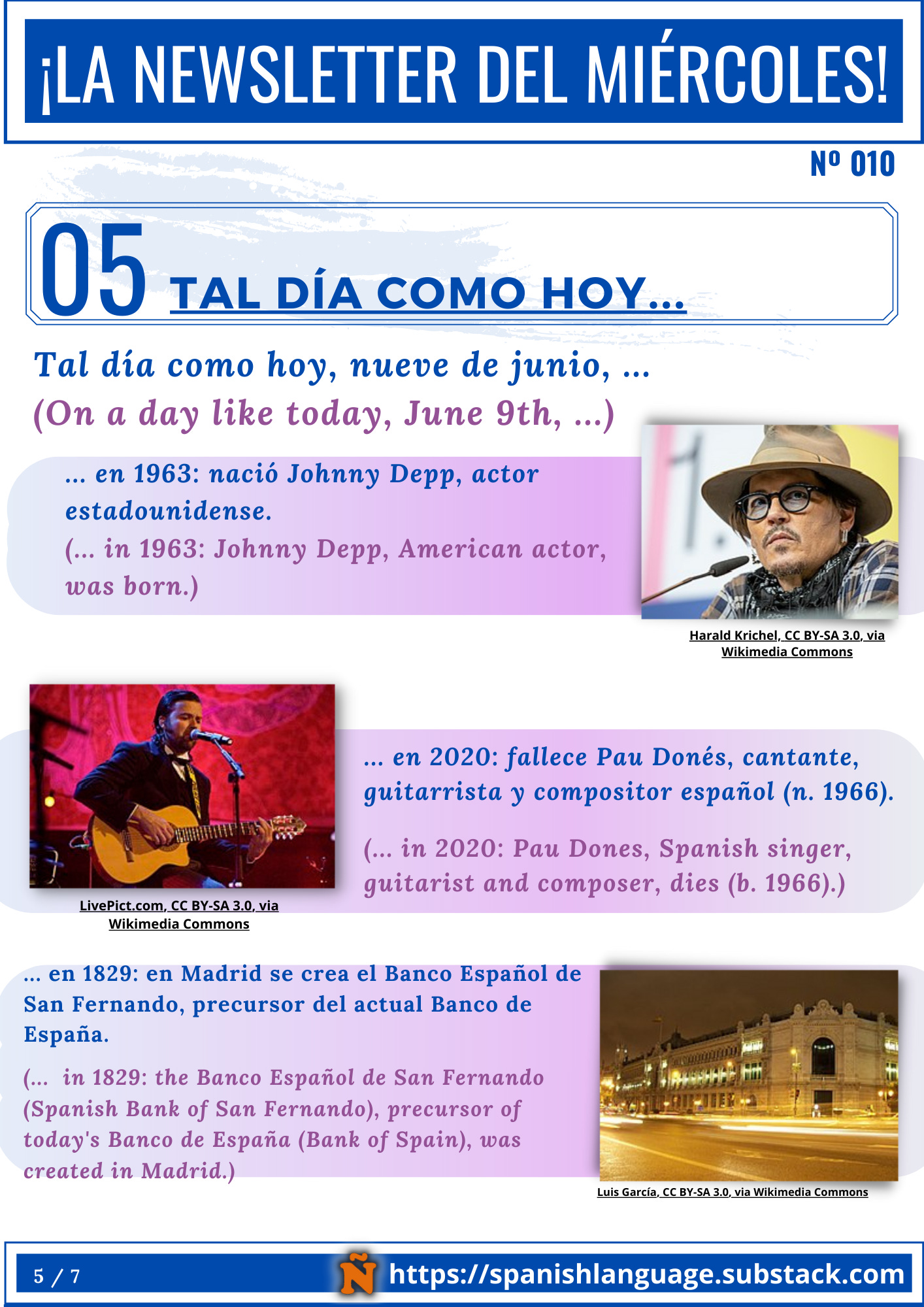You’re reading the free edition of Spanish Language and Spain Culture, a newsletter by Ángeles Fernández, which you can read about here.
Here you can find free information but... if one day you change your mind and decide to support my work... that would be great!
If you value my work and find it useful, please consider subscribing.
¡Hoy es miércoles! ¿Cómo va tu semana? Espero que bien.
Aquí tienes una nueva edición semanal, con…
La palabra de la semana: El sustantivo “Verborrea”.
El refrán de la semana: “Perro ladrador, poco mordedor”.
Sabías que…España es un país con más sitios declarados patrimonio de la humanidad.
¡El chiste de la semana!
“Tal día como hoy…”, con Johnny Depp, Pau Donés y la creación del Banco Español de San Fernando, precursos del actual Banco de España.
“Español Coloquial” con… ¡Vale!
(Today is Wednesday! How is your week going? I hope it's going well.
Word of the week: The substantive "Verborrea".
The proverb of the week: "Perro ladrador, poco mordedor”".
Did you know... “España es un país con más sitios declarados patrimonio de la humanidad.
The joke of the week!)
" On a day like today...", with Johnny Depp, Pau Donés and the creation of the Banco Español de San Fernando, precursor of today's Banco de España.
We have a new section: “Colloquial Spanish” with… ¡Vale.
¡Espero que te guste!
Click here to download this Newsletter del Miércoles (010) in .pdf format.
©Ángeles Fernández (2020) (https://spanishlanguage.substack.com)
You can also read:
Or follow me on:












muchas gracias Ángeles por otro boletín realmente interesante ... pero como siempre tengo algunas preguntas! ¿Podrías ser tan amable de contestarles?
1.¡Espero que te guste!
Can we use this phrase for other references:
I hope you like it ('it' in this case, an article) I hope you like it - (it = food) I hope you like (it) = the hotel etc?
2. "verbosidad excesiva"
In English we can
say
verbal diarrhea
"She has verbal diarrhea"
I thought it interesting that the origin of the Spanish word ends in 'rrea' - not so different from the English word!
3. The phrase
Espero que te encuentres bien.
Here I see 'te' and not 'tu' -
When translated
I hope that you are feeling well
Espero que (tu) - I still am confused when it is ti and not tu (even though I understand object/subject differences in these pronouns!)
4. Encuentres - translation 'find'
So, is the actual translation
"I hope this "finds" you well"
rather than I hope you are "feeling" well" (stated in the newsletter)
5. contentos = happy
I see other words like 'bien' meaning well
If asked, can I just say
"Estoy contenta!"
For the dog (in the newsletter) you used another word ! 'feliz' (happy dog) - is this also the same meaning could I say
estoy feliz??
6. The phrase
El caso es que (the thing is that)
could I use this for other contexts, e.g.
"El caso es que estoy ocupada, por eso no puedo hablar con ti, hoy."
7. The holiday and the packing hasn't finished yet.
Could I say
todavía no lo he hecho
(e.g I haven't done it (it = homework, in this case (not the packing)
8. Dog expression:
We also have 'its bark is worse than its bite" - did you know?
9. Words for 'web address'
You used
dirección web.
meaning web address.
Is 'link' also common (or the English word in Spanish)?
10. Ana, ¿Puedes ayudarme con este ejercicio, por favor? - ¡Vale, voy en un
minuto!
Translation: Can you help me with this exercise please?
Ok!, I will in a minute (because you used voy = future form?)
Correct?
and
Vale, nos vemos
translation:
"Right!, let's go!"
Muchas gracias por tus explicaciones!!